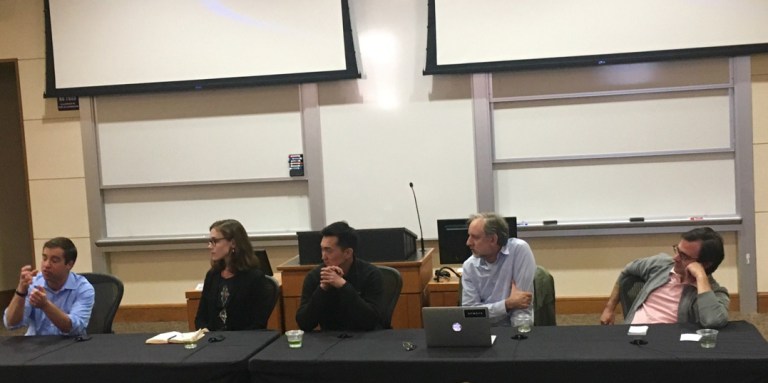On Thursday evening at the Stanford Law School, a Stanford Artificial Intelligence & Law Society (SAILS) panel titled “AI, Warfare and Autonomous Weapons” addressed the future of autonomous weapons, the technology race between the United States and China and the current state of artificial intelligence in military use.
The panel is part of an ongoing series of conversations hosted by SAILS and was principally organized by law student and SAILS president Zach Harned J.D. ’20.
Previous events focused on autonomous vehicles and biases in criminal policing. Three more panels regarding the potential societal impacts of artificial intelligence are also in the works.
“[SAILS’s] was to create a cross-modal exploration of the AI space because it is really touching so many domains,” Harned said.
Event panelists include symbolic systems associate director Todd Davies B.S. ’85 M.S. ’85 Ph.D. ’95, venture capital firm Point72 partner Daniel Gwak, D.C.-based national security think tank Center for a New American Security (CNAS) adjunct fellow Elsa Kania, CNAS senior fellow Paul Scharre, and Center for International Security and Cooperation (CISAC) fellow Andrew Grotto.
During the talk, Davies advocated a ban on killer robots, explaining that small artificially intelligent drones could be produced at a large enough scale to be considered a weapon of mass destruction. He also pointed out that the potential that these precise and intelligent weapons will be misused outweighs any benefits said weapons may bring.
“The types of technology we are talking about decouple the amount of weapons that can be deployed and the number of people [needed] to deploy them,” Davies said.
Gwak responded by discussing the potential for autonomous weapons to save lives on the battlefield by reducing collateral damage.
“The more precise the weapon, the more accurate we can be in the execution of war,” Gwak said.
Kania stated that progress in the field of AI and its varied applications to issues of national security present many possibilities.
“When we think about AI and the future of warfare, the range of possibilities is immense depending on which actor is using it and what their intentions are,” Kania said. “This will be a very complex and multifaceted revolution.”
Attendees of the event included Stanford undergraduate students, Stanford law students and outside guests.
Jakob Hjortshøj, a technology associate working for the Danish Foreign Ministry, attended the event in order to learn about how technology might impact foreign and security politics.
“I am here to learn more from the academic world about what is going on in the artificial intelligence sector,” Hjortshøj said.
Contact Chris Peisch at cpeisch1 ‘at’ stanford.edu.
